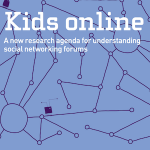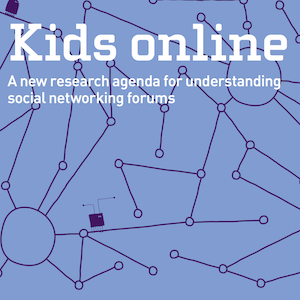 As readers of this blog already know, many people are hopeful about the opportunities that online environments can provide for children. There is great promise for learning technical literacies, developing social skills and contributing to our shared culture through participation in online sites. And indeed, kids are participating in growing numbers on online social sites, both at school and at home. Meanwhile, commercial companies and educational non-profits alike are eager to provide new spaces for such participation, even though that means navigating some tricky regulatory requirements, not to mention shifting public opinion. For while many parents, educators, and children want to take advantage of the new opportunities presented by the latest digital technologies, they are also often concerned about the challenges children might face in social environments online. Privacy, copyright, stranger danger, cyberbullying—these are all issues regularly discussed in the news, around the dinner table and in classrooms across the country.
As readers of this blog already know, many people are hopeful about the opportunities that online environments can provide for children. There is great promise for learning technical literacies, developing social skills and contributing to our shared culture through participation in online sites. And indeed, kids are participating in growing numbers on online social sites, both at school and at home. Meanwhile, commercial companies and educational non-profits alike are eager to provide new spaces for such participation, even though that means navigating some tricky regulatory requirements, not to mention shifting public opinion. For while many parents, educators, and children want to take advantage of the new opportunities presented by the latest digital technologies, they are also often concerned about the challenges children might face in social environments online. Privacy, copyright, stranger danger, cyberbullying—these are all issues regularly discussed in the news, around the dinner table and in classrooms across the country.
The two of us are well aware of the opportunities and challenges present for children in online social networking forums. We’ve each encountered these issues in our respective research on what kids do in virtual worlds and the opportunities for learning and development found in these spaces (in Debbie’s case), and on the ethical and regulatory issues associated with digital spaces specifically designed for and populated by children (in Sara’s case). So we were both very keen to get involved when the chance came up to work with the Joan Ganz Cooney Center on a white paper that delved into what the existing research had to say about kids’ and online social networking—from opportunities and challenges, to current trends and possible trajectories.
The paper, Kids online: A new research agenda for understanding social networking forums, is a first step to documenting pressing questions about children’s involvement online, namely:
- Which children are using social networking forums and what are they doing there?
- What do we know about how online experiences influence children’s social, cognitive, and creative development?
- What kind of research do we need to do now, in order to understand more deeply who is going online, what kinds of things they are doing, and what opportunities or challenges are involved?
- And finally, what should designers, educators, and parents be aware of as they navigate these new environments and try to help children make the most of them?
The results we present in this paper are surprising. First, children tend to be ignored in the big survey research that documents who is going online, how often, and what they are doing. This is partly because children present a challenging audience to reach—what kind of survey can researchers use to talk to children about what they do online (they usually go to parents and it’s just easier to talk to teens and young adults). Another factor is that although there’s lots of anecdotal and qualitative evidence that kids are using popular social media such as Facebook, legal Terms of Use and regulatory policies like the Children’s Online Privacy Protection Act often mean that children are not supposed to be there at all. Another important finding was that large-scale surveys and other research on social networking often overlook the kinds of social networking forums that children tend most to populate. Virtual worlds, console videogames (did you know kids can share creations and chat through videogame consoles?), and project-sharing sites where children share everything from written stories to art to computer-programmed animations are rarely discussed in comparison to social networking sites like Facebook.
Yet we do know some things. There are numerous opportunities for learning in sites that are designed well. This includes opportunities for sharing creations, getting feedback on writing, collaborating, sharing knowledge, developing literacies for reading not just printed text on a page but visual images, hyperlinked information, and the very makings of computers (i.e., computational literacy). The possibilities for using social networking forums to enhance and support children’s participation in cultural production and civic engagement are also extremely exciting. There are promises for social development too – social networking forums can provide lower risk environments for playing with identity (who one is and who one wants to be) as well as many links to other kids they might be intimidated to talk to in school life.
Many challenges lie ahead in regard to social networking forums. We need more research on children’s participation in online environments and studies of the type of social networking forums that children occupy in larger numbers than older adolescents and adults. We need to understand the roles of parents, family members, and friends in shaping children’s participation online, especially since families play a much stronger role in children’s everyday lives than they do in those of adolescents. We need to see things from children’s perspectives too. Instead of just interviewing parents, we need to hear from children about what they are doing, what challenges they are aware of, and what preferences they have when they’re online. And finally, we need to revisit legal and policy questions when it comes to figuring out who is regulating these spaces, under what criteria, and with whose consent.
Because it is a fact that kids are using online ‘social networking sites’ (SNS), or as we argue more broadly, ‘social networking forums’ (SNF), at increasingly younger ages, we need to develop a better understanding of the ways that these digital technologies mediate kids’ socializing as well as the relative opportunities and limitations for their participation in them. We look forward to some lively discussions as we all begin to learn even more about how kids are participating in these online forums.
 Dr. Deborah A. Fields focuses on the intersections of kids’ lives: between personal and academic interests, identity and learning, and across different social settings. These interests have guided her studies in virtual worlds and STEM (science, technology, engineering & math) education in and across classrooms, clubs, and digital social environments. She spent several years studying and writing about identity, avatar design, ethnicity, gender, and cheating in the virtual world of Whyville.net. Related, she recently co-authored a critical review of children’s participation in social networking sites for the Joan Ganz Cooney Center. Current interests include studying issues of aesthetics, learning, and gender in kids’ designs with digital technologies, specifically with computational textiles and computer programs made with Scratch. Thus she is especially interested in digital media that draws together creative production and social sharing of kid-created media. She currently leads and studies workshops for youth that focus on kids’ learning to computer program by making video games, music videos, and blinking clothes. Fields was a postdoctoral fellow at the University of Pennsylvania and a recipient of the Computer Supported Collaborative Learning Best Student Paper award. She is serving as program Chair of AERA’s Special Interest Group Media, Culture, & Curriculum.
Dr. Deborah A. Fields focuses on the intersections of kids’ lives: between personal and academic interests, identity and learning, and across different social settings. These interests have guided her studies in virtual worlds and STEM (science, technology, engineering & math) education in and across classrooms, clubs, and digital social environments. She spent several years studying and writing about identity, avatar design, ethnicity, gender, and cheating in the virtual world of Whyville.net. Related, she recently co-authored a critical review of children’s participation in social networking sites for the Joan Ganz Cooney Center. Current interests include studying issues of aesthetics, learning, and gender in kids’ designs with digital technologies, specifically with computational textiles and computer programs made with Scratch. Thus she is especially interested in digital media that draws together creative production and social sharing of kid-created media. She currently leads and studies workshops for youth that focus on kids’ learning to computer program by making video games, music videos, and blinking clothes. Fields was a postdoctoral fellow at the University of Pennsylvania and a recipient of the Computer Supported Collaborative Learning Best Student Paper award. She is serving as program Chair of AERA’s Special Interest Group Media, Culture, & Curriculum.
Twitter: @StrawbrryBlond
 Dr. Sara M. Grimes is Assistant Professor in the Faculty of Information at the University of Toronto, and Visiting Professor in Book and Media Studies at the University of St. Michael’s College. She researches primarily in the areas of children’s digital media culture(s), play studies and critical theories of technology, with a special focus on videogames. Sara has published work exploring the commercialization of children’s virtual worlds and online communities, the articulation of a critical theory of digital game play, discussions of intellectual property and fair dealing in digital game environments, as well as the legal and ethical dimensions of marketing to children online. Her work has appeared in journals such as New Media & Society, The Information Society, The International Journal of Media & Cultural Politics, Media International Australia and Communication, Culture & Critique, as chapters in edited volumes, as well as various magazines and blogs. She has also presented her research at a number of national and international conferences, workshops and festivals.
Dr. Sara M. Grimes is Assistant Professor in the Faculty of Information at the University of Toronto, and Visiting Professor in Book and Media Studies at the University of St. Michael’s College. She researches primarily in the areas of children’s digital media culture(s), play studies and critical theories of technology, with a special focus on videogames. Sara has published work exploring the commercialization of children’s virtual worlds and online communities, the articulation of a critical theory of digital game play, discussions of intellectual property and fair dealing in digital game environments, as well as the legal and ethical dimensions of marketing to children online. Her work has appeared in journals such as New Media & Society, The Information Society, The International Journal of Media & Cultural Politics, Media International Australia and Communication, Culture & Critique, as chapters in edited volumes, as well as various magazines and blogs. She has also presented her research at a number of national and international conferences, workshops and festivals.
Twitter: @smgrimes


